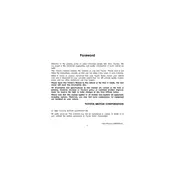Toyota 4Runner 2000 Owner's Manual


The recommended oil type for the Toyota 4Runner 2000 is 5W-30. It is important to use the correct oil to ensure optimal engine performance and longevity.
The timing belt for a 2000 Toyota 4Runner should be replaced every 90,000 miles or every 6 years, whichever comes first. Regular inspections are also recommended to check for wear and tear.
The towing capacity of the Toyota 4Runner 2000 is approximately 5,000 pounds. It's crucial to adhere to this limit to ensure safety and avoid damage to the vehicle.
Vibration at high speeds can be caused by unbalanced tires, misaligned wheels, or worn suspension components. It's advisable to have a professional mechanic inspect the vehicle to diagnose the exact issue.
To reset the check engine light, you can disconnect the negative battery terminal for about 15 minutes. However, it's important to address the underlying issue causing the light to turn on before resetting it.
Common symptoms include dimming headlights, a dead battery, strange noises, and the battery warning light illuminating on the dashboard. If you experience these symptoms, it's important to have the alternator inspected and repaired if necessary.
To change the air filter, locate the air filter housing near the engine, unclip or unscrew the cover, remove the old filter, and replace it with a new one. Ensure the filter is seated correctly before securing the housing.
The recommended tire pressure for a 2000 Toyota 4Runner is typically around 32 psi for both front and rear tires. You can find the exact specifications on the sticker inside the driver's door or in the owner's manual.
To improve fuel efficiency, ensure regular maintenance like oil changes and air filter replacements, check tire pressure regularly, reduce excess weight in the vehicle, and drive at moderate speeds.
If you notice a coolant leak, check the radiator, hoses, and water pump for visible damage. Keep the coolant topped up and take your vehicle to a mechanic for a thorough inspection and repair.